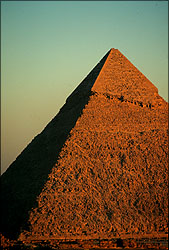
|
Khafre's Inside Story
 Khafre, who was the son of Khufu, was also known as Rakhaef or Chephren.
He ruled from 2520 - 2494 B.C. and is responsible for the second largest pyramid
complex at Giza, which includes the Sphinx, a Mortuary Temple, and a Valley
Temple. The most distinctive feature of Khafre's Pyramid is the topmost layer of
smooth stones that are the only remaining casing stones on a Giza Pyramid. Khafre, who was the son of Khufu, was also known as Rakhaef or Chephren.
He ruled from 2520 - 2494 B.C. and is responsible for the second largest pyramid
complex at Giza, which includes the Sphinx, a Mortuary Temple, and a Valley
Temple. The most distinctive feature of Khafre's Pyramid is the topmost layer of
smooth stones that are the only remaining casing stones on a Giza Pyramid.
Dates Built: c. 2558-2532 B.C.
Total Blocks of Stone:
Base: 704 feet (214.5 m) on each side covering a total area of 11
acres
Total Weight: undetermined
Average Weight of Individual Blocks of Stone: 2.5 tons, some of the
outer casing blocks of stone weigh in at 7 tons
Height: Originally 471 feet (143.5 m) tall, now 446 feet (136 m)
tall
Angle of Incline: 53 degrees 7' 48"
Construction Material: Limestone and red granite
Khafre may be best known for his statues, and most famous among them is, of
course, the Sphinx. Mark Lehner and Zahi Hawass write of Khafre: "He was,
after all, perhaps the greatest maker of statues of the Pyramid Age. There are
emplacements in his pyramid temples for 58 statues, including four colossal
sphinxes, each more than 26 feet long, two flanking each door of his Valley
Temple; two colossal statues, possibly of baboons, in tall niches inside the
entrances of the Valley Temple; 23 life-size statues of the pharaoh in the
Valley Temple (fragments of several have been found with his name inscribed on
them); at least seven large statues of him in the inner chambers of his Mortuary
Temple; 12 colossal Khafre statues around the courtyard of his Mortuary Temple;
and ten more huge statues in the Sphinx Temple."
Photo: Aaron Strong
Pyramids Home | Pyramids | Excavation
Contents | Mail
|